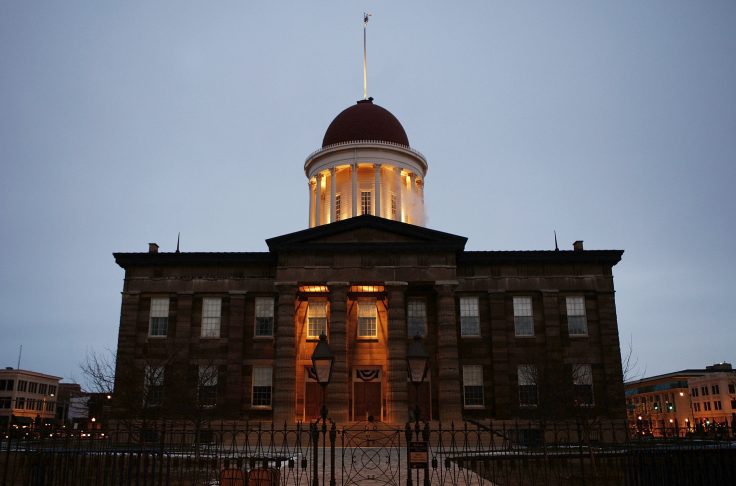An investigation from the Chicago Tribune and ProPublica Illinois found disturbing abuses of the controversial practice of confining school children with behavioral problems and mental disabilities.
While Illinois has not joined other states in banning child confinement altogether, Illinois teachers and administrators repeatedly violated state rules on so-called timeout rooms, locking kids up for such problems as spilling milk and shouting, the Tribune reports. Administrators describe these spaces as "reflection rooms" and use other euphemisms, but reporters looked into more than 20,000 incidents from the 2017-18 school year and found many instances of children with disabilities being traumatized by extended periods in solitary confinement—including one who was locked up for 10 hours.
"In the nearly 50,000 pages of reports reporters reviewed about Illinois students in seclusion, school workers often keep watch over children who are clearly in distress," the article states. "They dutifully document kids urinating and spitting in fear or anger and then being ordered to wipe the walls clean and mop the floors."
Education professor Scot Danforth told the Tribune that teachers may have justified keeping students in confinement because they saw many of the children as "defective" due to their disabilities.
"You really have to believe that you're dealing with people who are deeply defective [to put children in timeout rooms]. And that's what the staff members tell each other," said Danforth, a professor at Chapman University in California. "You can do it because of who you're doing it to."
Illinois law prohibits using confinement as a punishment, reserving it for safety issues only. But some schools systematically incorporate it into the discipline regime:
By 8:35 a.m. on Dec. 19, 2017, all five of the timeout "booths" at Bridges Learning Center near Centralia were already full. School had been in session for five minutes.
Each booth is about 6 by 8 feet, with a steel door. That day, one held a boy who had hung on a basketball rim and swore at staff when they told him to stop. In another, a boy who had used "raised voice tones."
Two boys were being held because they hadn't finished classwork. Inside the fifth room was a boy who had tried to "provoke" other students when he got off a bus. Staff told him he'd be back again "to serve 15 minutes every morning due to his irrational behavior."
None of those reasons for seclusion is permitted under Illinois law.
...
According to the Tribune/ProPublica Illinois analysis of Bridges records, 72% of the seclusions were not prompted by a safety issue, as the law requires.
Administrators in Kaskaskia Special Education District, which covers Bridges, did not respond to the reporters' request for comment.
Children frequently begged not to be locked up. "I don't want to go in a booth. You'll lock me in there all day," one boy reportedly said. He spent five hours in confinement.
The practice led to injuries for some students, who beat the walls of the rooms or otherwise harmed themselves while inside. The school's own reports were often kept from parents, but what reporters found was that teachers and administrators were aware of such incidents.
When he was seven years old, a boy named Isaiah was found by his mother banging his head inside one of the isolation rooms in Middlefork School in Danville. It was something he did not do at home, but he had been doing it for years at school without his mother being notified:
"Isaiah states he has headache and ringing in his ears," according to a report from Dec. 8, 2017. "Nurse filling out concussion form."
Then, a month later: "Nurse is concerned he has been head banging several times, even slower to answer than usual, he was dizzy when he stood up, almost fell over."
Sitting in his home last spring, Isaiah, now 10, looked down when asked why he hits his head.
"I tell the teachers why," he said. "The timeout room … I don't like it."
Records and interviews show how seclusion can harm children. Students ripped their fingernails or bruised their knuckles hitting the door. Their hands swelled and bled from beating the walls. In some cases, children were hurt so badly that ambulances were called.
These problems have persisted despite Illinois being one of the highest spenders in the country on educational administrative costs. Meanwhile, pension liabilities are threatening the state's finances even as their educational outcomes are mediocre.
Illinois's largest city, Chicago, has prohibited confinement of students, but the Tribune noted that Chicago schools often ship mentally disabled students off to schools that maintain the practice.
The state has recently faced numerous other crises in education. Chicago's public schools were completely shut down at the beginning of the school year due to a teachers strike. Mayor Lori Lightfoot (D.) has still not reached a final deal with the Chicago Teachers Union. The bargaining agreement will reportedly put all Illinois taxpayers on the hook for Chicago teachers' pensions, worsening the pressure government employee retirement funds are putting on the state's finances.
